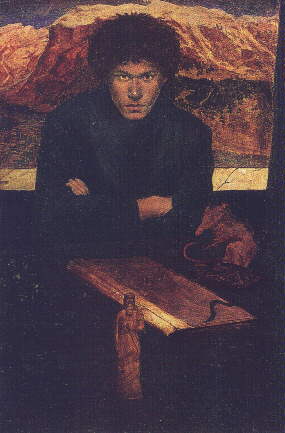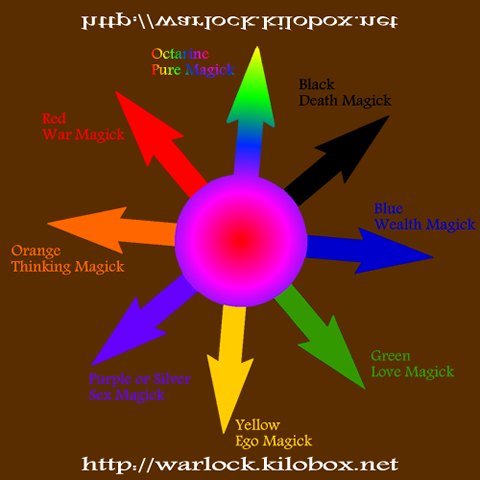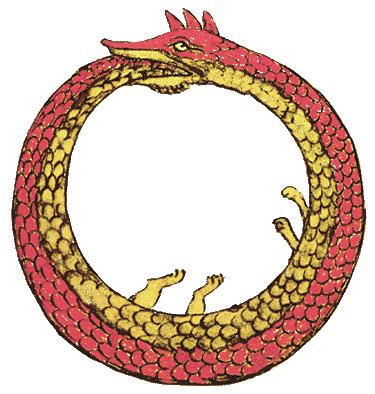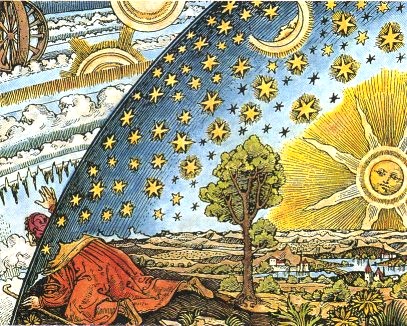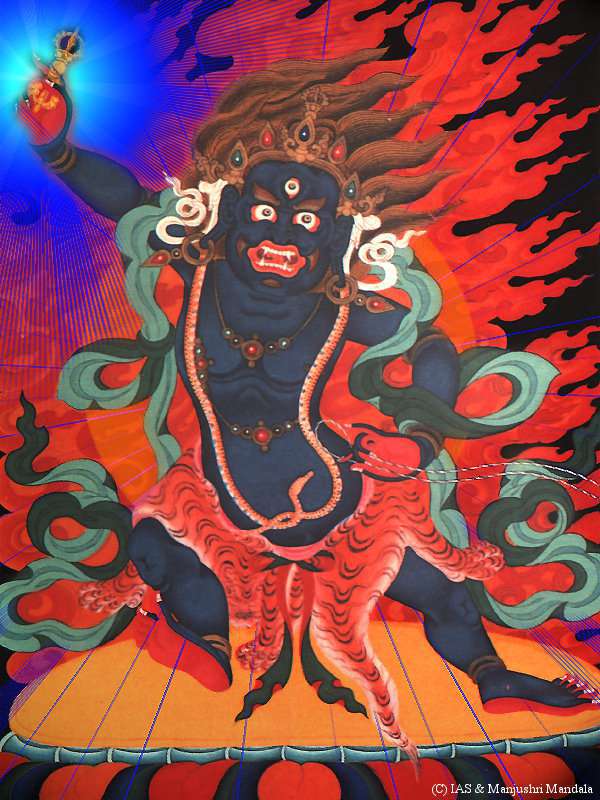„Do I contradict myself? I embrace multitudes.” (Walt Whitman)
„Belief is the fall from the Absolute. What are you going to believe? Truth seeks its own negation. Different aspects are not the truth, nor are they necessary to truth. Of its emanations which are you to strangle at birth? Are you illegitimate? You believe in right and wrong— what punishment will you determine? Can you escape the driving ‘Must’?” (Austin Osman Spare: The Book of Pleasure (Self-Love) – The Psychology of Ecstasy. For his self-portrait see above)
„We accept the proofs of Hume, Kant, Herbert Spencer, Fuller, and others of this thesis: The Ratiocinative Faculty or Reason of Man contains in its essential nature an element of self-contradiction.“ (Aleister Crowley: Equinox Vol 1 No 2)
„Odin is the Chaos Magician of traditional Northern European belief who dares anything and everything in his quest for wisdom and knowledge.“ (Ian Read)
The magickal jouney is circular, spiral, and chaotick. Not linear, orderly and without regressions / set-backs. I looked for a Higher Order, but found thee chaotick Vision and the Void. The Voice from within the Silence that leads me on. The only answer is to ask more questions. The only truth is to become a question mark? The only path is to reject fixed systems and to create your own system – not to become trapped in the labyrinth of some other man. „I must Create a System, or be enslav’d by another Man’s. I will not Reason & Compare: my business is to Create.“ (St. William Blake) The magickal journey can never be an easy one, because then it ceases to be an adventurous expedition into the unexpected and the Unknown. I wanted Tradition but found dead letters. Traditions are the old, empty exoskeletons of an ancient serpent that is always turning and shedding skin. People then worship the dead skin calling it „Tradition“ and do not see the breathing, beautiful serpent behind the outer forms. They do not ride the living snake to the ancient lake. This snake erupts from Ginnungagap, the Almighty Chaos – Mother of Matter and Aether. The truth of today is the lie of tomorrow. My realizations of the past are nothing I shall hang on to on my initiatory journey.
„The personality, a mask of convenience, becomes stuck to the face. Eye becomes clouded by ‘I.’ The human spirit becomes a trivial mess of petty identifications. The most cherished principles are the greatest lies. ‘I think therefore I am.’ But what is ‘I’? The more you think, the more the I closes. Thinking, ‘I am alseep’; my I is blinded. The intellect is a sword, and its use is to prevent identification with any particular phenomenon encountered. The most powerful minds cling to the fewest fixed principles. The only clear view is from atop the mountain of your dead selves. “ (Carrol, Liber Null, p. 48)
All the persons I have been, all the masks I have born and all the clothes and ideologies I have worn are now torn – they are not me, but my „dead selves.“ This is a strange mystery: that the body that has been born is not the same body that will die. „This is the creation of the world, that the pain of division is as nothing, and the joy of dissolution all.“ (AL I, 30) Our body cells are replaced a few times during our life. Yet there is an „I“, a feeling of self-ness all of the time (except you’re asleep or in uttermost ecstasy). Movement is a sign of SPIRITedness. We invent ourselves while we are moving through time and space. Otherwise „I“ will stagnate. But it has been written: Solve et coagula („Dissolve and Join Together“). No golden books are to be found but mystery. I wanted the answer. And I got it. Neatly boxed in perfect shape. Like a present from the devil. It looked ancient and impressive. Symbols of old were carved on it. This must be it! Do you think so? I tell you something: Wisdom is boring and costs 19.95 USD from Amazon.com.
Over the last years I have had kind of a troublesome relationship with Chaos Magick (CM). On the one hand it’s like I’ve been born for that current. Should I dare to say, I have been born by Chaos Magick? On the other hand there is an attitude of postmodern consumerism hidden in CM that I always rejected. I discarded CM a few times and like a boomerang it kept coming back to me. Not through books or the like, but from within. But I think my great antagonism has been the fact that I didn’t dare to trust mySelf in a deep sense. That’s why I always looked for some „father figure“ in magick to lead me on my path. Jung called this a father imago, an inner picture, often an idealized image of a person, usually a parent, formed in childhood and persisting unconsciously into adulthood. This was interrelated with my search for a coherent magickal system or ancient tradition. This in itself is not a bad thing when seen in the context of developmental stages of an initiatory journey. But of course the magickal arena is over-crowded with „gurus“ who would like to take over this role. In most cases not out of unselfish reasons, to say the least. However, being a hardcore sceptic and Anarch who asks too many questions I never really walked into this trap, except in a philosophical sense. This led me to call myself by such diverse names as Catholic, Nihilist, Anarchist, Aristocrat, Conservative, Thelemite, Buddhist, Gnostic, Pagan, folkish and universalist Ásatrúar, Odian, Libertarian, Tantric, Tradionalist, Futurist and so forth. The simple truth is that „I“ am „We“ and „We Are Legion“ (Carrol). Hence Anon. „This shall be your only proof. I forbid argument. Conquer! That is enough.“ (AL III, 11) Of course, I can find in all of my former positions and all the diverse worldviews I adopted something of value to me today. I learned from all these positions. They are like pieces of a puzzle to the most puzzling of all mysteries: my Self. That’s why, in hindsight, I think I’ve always been a Chaos Magician. In some sense I’ve even been a combination of an eclectic and a systematic „paradigmal pirate“, as Joshua Siddhartha Wetzel would have put it – but I haven’t been this in a conscious and deliberate way. And I don’t know if I will ever be. „In The Paradigmal Pirate, Joshua Wetzel made a distinction between eclectic and systematic paradigm piracy. Eclectic paradigm piracy is similar to religious syncretism, except that the resultant belief systems are temporary. Systematic paradigm pirates, on the other hand, tend to embrace existing belief systems as a whole, often pursuing official membership in organized religions or other groups. Systematic paradigm pirates also often strive for strict orthodoxy in their chosen paradigms, and may appear indistinguishable from other adherents of that faith for the times that they are there. It is also not unusual for a paradigm pirate to use a combination of the two approaches.“ (Tsuzuki 26)
There are some fine chaosmagickal Grimoires out there, but true CM is your magick. Also, the situation in CM is changing and it becomes far more diverse in its approaches. And if one criticises paradigmal piracy, one has to acknowledge that not everything is bad about the current situation of being exposed to the „spiritual supermarket“ and using it to your own ends. People learn from different angles and eventually deepen their knowledge, when they stick to a tradition or they invent their own system (or both simultaneously). I tend to be a terrible fanatic whith my criticisms. Not everything in this age is bad. If you want to be a Viking today, become an astronaut and explore outer space! How many Americas, Africas and Australias are to be found there? Take of your viking clothes and don the astronaut spacesuits. Join the International Explorer’s Guild and reyn til Runa – seek the Unknown! „There is nothing new under the sun.“ (Ecclesiastes 1:9) Do you say so? Then seek out other suns in other solar systems! It’s so easy to be an anti-modernistic arsehole whilst enjoying all the freedoms of an age that is as interesting as hell! Men flying to the moon, communicating with people from all over the world by the click of a button, and a mankind that becomes slowly aware of the fact that Life is a vast and living, interdependent Intelligence System (ok, very slooowleey). Hopefully we will realize this before it’s too late for us. Billions of millions of years of evolution were necessary for us – the intelligent apes – to evolve on this planet and finally to become conscious of ourselves. Only to fuck up the whole situation and destroy ourselves by destroying our natural environment? If I may make a joke: Just consider Hegel’s Weltgeist, the world spirit, and its disappointment after billions of years of unfolding. No aim in history at all? No teleology? Really? Immanentize the Eschaton! Now!
„Most amazing is this realization that everything that exists in the universe came from a common origin. The material of your body and the material of my body are intrinsically related because they emerged from and are caught up in a single energetic event. Our ancestry stretches back through the life forms and into the stars, back to the beginnings of the primeval fireball. This universe is a single multiform energetic unfolding of matter, mind, intelligence, and life. And all of this is new. None of the great figures of human history were aware of this. Not Plato, or Aristotle, or the Hebrew Prophets, or Confucius, or Thomas Aquinas, or Leibniz, or Newton, or any other world-maker. We are the first generation to live with an empirical view of the origin of the universe. We are the first humans to look into the night sky and see the birth of stars, the birth of galaxies, the birth of the cosmos as a whole. Our future as a species will be forged within this new story of the world. … To begin with, you will have to embrace your creative potential. The universe has unfolded to this point. It has poured into you the creative powers necessary for its further development. The journey of the cosmos depends on those creatures and elements existing now, you among them. For the unfolding of the universe, your creativity is as essential as the creativity inherent in the fireball. … 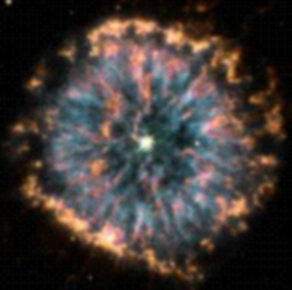 The human provides the space in which the universe feels its stupendous beauty. The universe shivers with wonder in the depths of the human. Do you see? … From the same place that everything comes from [we come from]. From the same place out of which the primeval fireball comes: an empty realm, a mysterious order of reality, a no-thing-ness that is simultaneously the ultimate source of all things.“ (Brian Swimme: The Universe is a Green Dragon)
The human provides the space in which the universe feels its stupendous beauty. The universe shivers with wonder in the depths of the human. Do you see? … From the same place that everything comes from [we come from]. From the same place out of which the primeval fireball comes: an empty realm, a mysterious order of reality, a no-thing-ness that is simultaneously the ultimate source of all things.“ (Brian Swimme: The Universe is a Green Dragon)
The Germanic ancients called it Ginnungagap. But back to the matter at hand: chaos magick. Dead or alive. Devil or god. With gand or gun. Hidden or forbidden. I don’t care: just give me full gnosis tonight! It seems to me that though we can stick with a system, it’s more the attitude that’s important. Dave Lee wrote to me:
„As for chaos magic, I see it as the premier critique of magical technique in the world today, and so I would unhesitatingly recommend elements of the chaos magic approach in any deep system of magical training. CM does not of course tend to adress issues outside of technique, and so there lies the need for a broader philosophy of life within which we weave our techniques.“
For me this philosophy is Chaos Heathenism. I hardly believe that one can build one’s magickal or spiritual philosophy on UPGs alone, though some do it and by doing so all too often only incorporate unknowingly the postmodern zeitgeist into their worldviews that reveals behind it a consumerist logic of late capitalism – the worst example being New Age. Considering the postmodern outlook of CM one shoud be aware that though POMO thought denies to follow the modernistic conception of „universal rules“ (of life, art, philosophy or anything else), it includes also the risk of fundamentalist relativism and an „epistemological hypochondria“ (Clifford Geertz), where „anything goes“ and where consequently real knowledge becomes impossible anymore. And as Dave Lee warns in Bright from the Well, postmodernism isn’t magic-friendly in the long run, because it doesn’t support any hierarchical levels of consciousness. Do the formulae of CM – to that I sometimes referred to as the „dark twin“ of the New Age – transcend that postmodern logic of consumerism with their battle call of Nothing is true, Everything is trance-mitted? Or do they replicate and reinforce that logic? This tension lies at the heart of many of the new forms of CM and cyberpaganism, „which in their own way reflect the ‘magical logic of late capitalism’. Are they merely reflections of an increasingly pluralistic, rapidly changing, hedonistic, and ‘chaotic’ consumer society? Or do they also offer the hope of breaking free of that culture? Does the quest for radical liberation from even the boundaries of the self really lead to any meaningful sort of freedom? Or has it simply transformed the ideas of ‘liberation’ and ‘transgression’ themselves into commodities that can be purchased for 19.95 US-Dollars from Amazon.com?“, the Tantric scholar Hugh B. Urban asks in his witty and interesting book Magia Sexualis – Sex, Magic, and Liberation in Modern Western Esotericism.
That’s why, I think, CM must become aware of this dilemma and move beyond mere spiritual consumerism (which the CM current does, I observe). We should respect the traditions we encounter, especially when they are still alive (like some shamanic cultures). We can be respectless to their dogmas and superstitions in our own magickal work. We can discard what does not work for us, but not by disrespecting the peoples and their cultures from where we have taken the symbolism / methods / tools. This applies, of couse, also to the Runic tradition and our own ancestors and their culture in which the Runes originated. To decontextualise and universalise shamanic systems is in essence what New Age ideology does, which is nothing but the internalized cultural matrix of late capitalism projected forth into the sublime realms of spirituality. (I hope you survive so much intellectual „leftism.“)
It’s good to be aware of this when one employs the Chaos approach to whatever tradition one is working with. In my case, of course, the tradition is the Runic one. The question how the approaches of Chaos Magick and the Germanic Tradition inform eachother is hard to answer and probably can only be answered or worked out individually.The contraditions between these two currents are apparent. But the deep connections are hidden – as all secret knowledge in magick. I as a Chaos Heathen unite these two different currents in a kind of Dagazian paradox. „Chaos Heathenism is our philosophy. Heathenism is the spiritual harbour from which we sail, but like chaos magicians we are creative and irreverent and are not afraid to explore all manner of strange new oceans. In this we identify with the spirit that inspired so many Viking expeditions, as well as the far-reaching web of our ancestor’s trade routes and travails.” (Henry / Harigast)
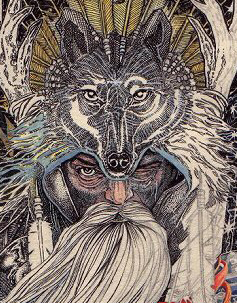
My suggestion here is that the magician can walk in Óðinn’s footsteps, but at the same time s/he dares to explore new corners of the spirit and cutting edge magick. This is in accordance with the Óðinnic example to leave no stone unturned in your quest for wisdom and knowledge. As a Rune Magician called Thomas Wade Curtis said to me three years ago on Rune-Net: „Whatever you have learned from any source – if found useful – will become a tool. You will carve your own path with that tool and the insight gained. I believe you can learn from all paths, as in Chaos, stripping the wheat from the chaff, and deriving the essential technique and goal, from said path/practice, and then apply it to your current.“ The magician who travels Óðinn’s path, to praphrase Crowley, walks „with his head in the clouds and his feet firmly on the ground“… and seeks restlessly, like the Chaos Star points out, in all directions for Her – Miss Unknown. The Chaos Star itself, if imposed on Midgard (the magician’s self) on the Yggdrasil pattern as shown in Nine Doors of Midgard, could symbolise the expanding or travelling of the self into the eight directions of the other eight worlds.
A chaos magician from Berlin once told me that if the phrase „Nothing is true“ is true, then this sentence itself is untrue. Such an interpretation opens up a completely different perspective, I think. He also told me that to him chaos magicians, if they get beyond the obvious and deeper into the mysteries, should realize at some pont that shifting paradigms (or paradigmal piracy) has the purpose to discover that all magick derives from within the psyche, not an external symbol system. It’s not an end in itself and to think otherwise is to get stuck in a postmodern illusion, he assumed. However, creating your own system seems to me to be a worthy task for every seeker on his magickal path of individuation. Interstingly only a few magicians ever dedicate to the task of developing their own system of magick in a conscious and deliberate way. Finally, I’d like to quote Frater Stokastikos 127 and thus „reveal“ my aspiration in magick – beside falling in love with „Miss Terry“, also known as Mystery.
„Chaos, the life force of the universe, is not human-hearted. Therefore the wizard cannot be human-hearted when he seeks to tap the force of the universe. He performs monstrous and arbitrary acts to loosen the hold of human limitations upon himself. The magical life demands the abandonment of comfort, conventionality, security and safety — for competition, combat, extremes, and adversity are needed to produce higher resolutions and personal evolution. An air of desperation is required in a life lived close to the edge. One must be living by one’s wits. In a stagnant environment the body-mind creates its own adversity — disease and fantasy. Only in extremes can the spirit discover itself. A fluid environment is required as a vessel for magical consciousness. Only a fluid environment can conform to beliefs about it and be subject to the subtle magic forces. Only in mutable circumstances can divination come into its own. Therefore abandon all fixed patterns of residence, employment, relationship and taste. Among the titles of Kia is Anon. Anon freely transmogrifies its arbitrary personality, refusing any identity defined by its environment. Residing in the ultimate freedom possible on the plane of illusion, it has choice of duality. Everything which exists for it is a form of desire, for this is the universe in which it willed to incarnate. If this were believed to be either heaven or hell one would feel free to do anything. It is only the fear it is neither which imprisons us. The idea of mind or ego as a fixed attribute or possession of Self is illusory. All that can be said of Kia is that the amount of meaning one experiences is proportional to Kia’s manifestation in one’s circumstances. Kia is felt as meaningfulness, power, genius, and ecstasy in action. Outside of this nothing is true. The wizard doeth as he wilt on this illusory plane, knowing that nothing is more important than anything else and that anything he does is only a gesture. He is thus free to do anything as though it mattered to him. Acting without lust of result, he achieves his will. In the arena of Anon compete numerous selves, souls, familiar spirits, demons, obsessions, and an infinity of possible experiences. Each game is short, and then the pieces are hurled through death into unrecognizable new configurations. Only the style and spirit of Anon’s play survive transmogrification, unless the aetheric body has achieved great integration. “ (Carrol, Liber Null, p. 67-68)
